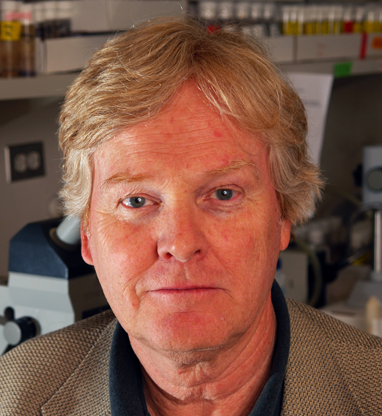Young wins Nobel Prize
in medicine or physiology
at the Rockefeller University and and at Brandeis University have won the for their discoveries of molecular mechanisms controlling circadian rhythm.
The oscillations of the circadian rhythm are responsible for the regular, daily functioning of countless biological processes, including sleep, metabolism, hormone regulation and body temperature. By exploring the process in fruit flies, the Nobel laureates isolated the gene that drives the oscillations by encoding a protein that accumulates in cells during the day and is degraded at night. This daily cycle, by which cellular clockwork is coupled to the Earth’s, has since been observed in plants, animals, fungi and cyanobacteria.
 Michael W. Young
Michael W. Young
The Nobel Assembly at Karolinska Institutet in Sweden, which issues the prize, in a press release noted that “the seminal discoveries by Hall, Rosbash and Young have revealed a crucial physiological mechanism explaining circadian adaptation, with important implications for human health and disease.”
Young, a member of the 涩里番 and the National Academy of Sciences, earned his B.A. in biology in 1971 and his Ph.D. in genetics in 1975 at the University of Texas at Austin. He followed that up with a postdoc at Stanford University. He has been a faculty member at Rockefeller since 1978.
Young will share one-third of the $1.1 million prize with Rosbash and Hall.
“In 1930, George and Ira Gershwin published their famous jazz song, ‘I Got Rhythm.’ Well, it turns out, we all got rhythm. Even the simple fruit fly got rhythm. And, amazingly, it’s the same rhythm,” says , an endowed professor at Weill Cornell Medical College and professor emeritus at Brandeis.
Petsko continued: “(Circadian rhythm) explains why we sleep when we do and why we feel wiped out when we take a long airplane trip across many time zones. It is one of the most fundamental processes in all higher organisms. (T)hanks to the laureates, we now know the words and lyrics — i.e, the mechanism — of that rhythm as well as we do that of the Gershwins.”
Enjoy reading ASBMB Today?
Become a member to receive the print edition four times a year and the digital edition monthly.
Learn moreGet the latest from ASBMB Today
Enter your email address, and we鈥檒l send you a weekly email with recent articles, interviews and more.
Latest in People
People highlights or most popular articles

Designing life鈥檚 building blocks with AI
Tanja Kortemme, a professor at the University of California, San Francisco, will discuss her research using computational biology to engineer proteins at the 2026 ASBMB Annual Meeting.

Jordahl named Gilliam Fellow
He will receive three years of funding to support his thesis research.

Bibel named assistant professor
She began her position at Loyola Marymount University in August 2025.

Unraveling the language of histones
Philip Cole presented his research on how posttranslational modifications to histones are involved in gene expression and how these modifications could be therapeutically targeted to treat diseases like cancer.

Cotruvo named Blavatnik award finalist
He received a $15,000 prize and was honored at a gala in October.

Phosphatases and pupils: A dual legacy
Yale professor Anton Bennett explores how protein tyrosine phosphatases shape disease, while building a legacy of mentorship that expands opportunity and fuels discovery in biochemistry and molecular biology.

